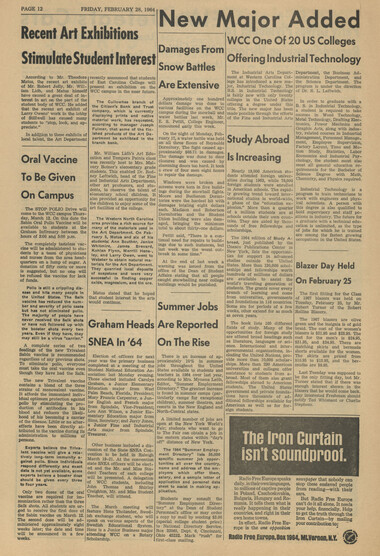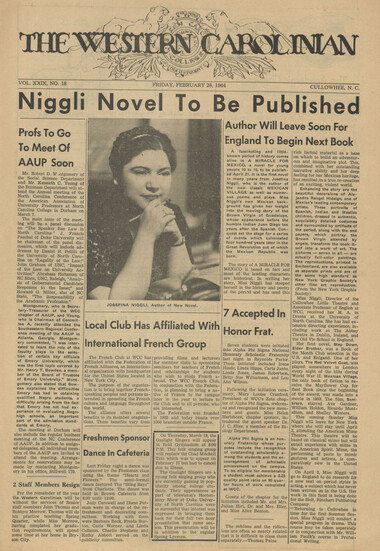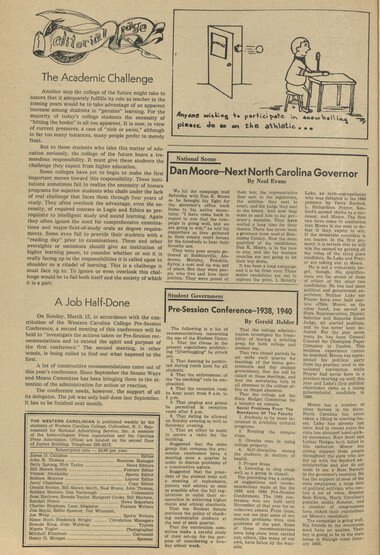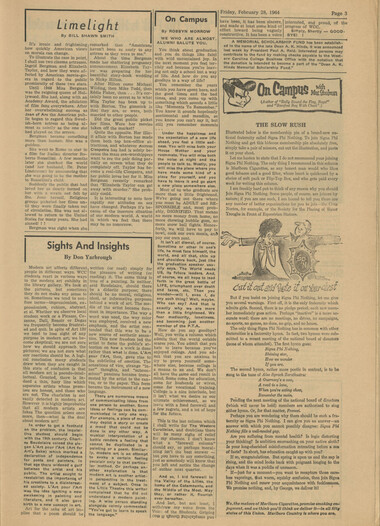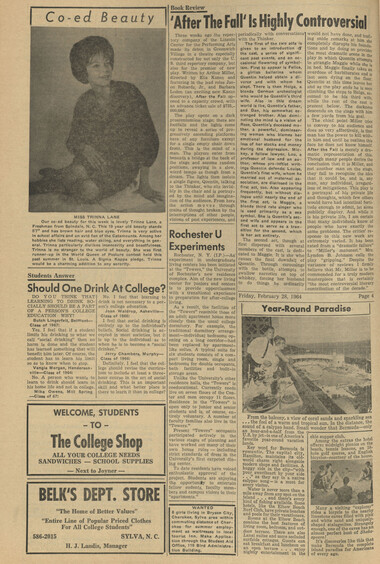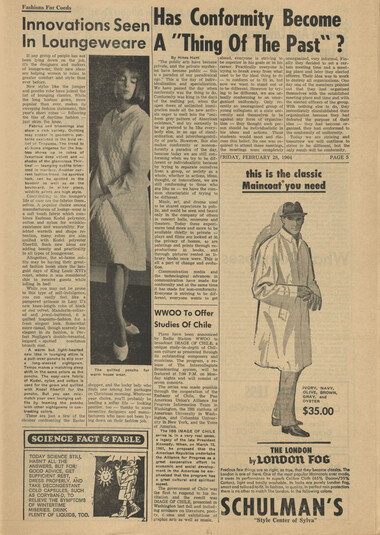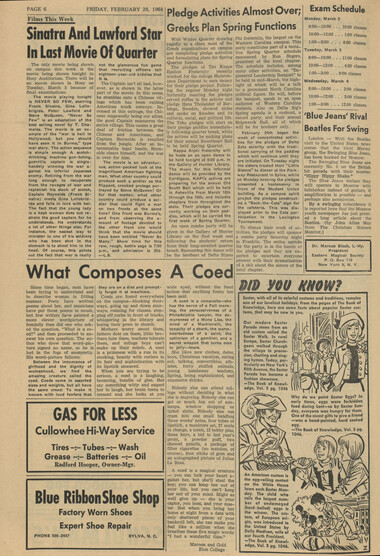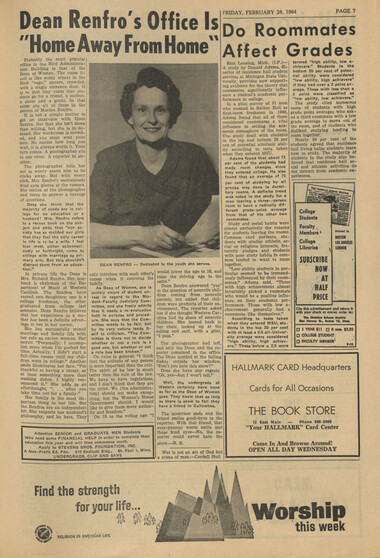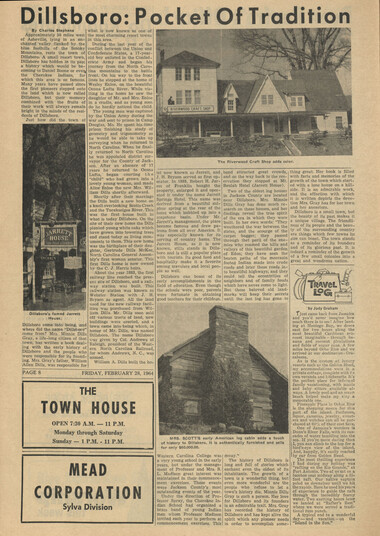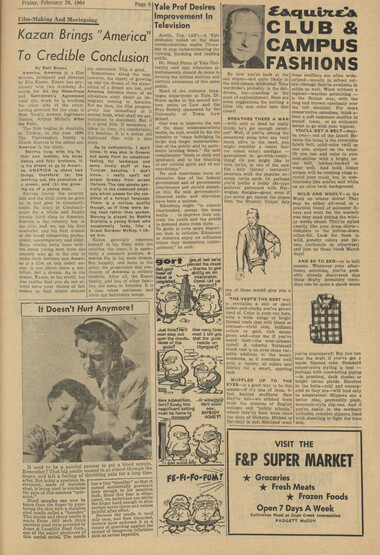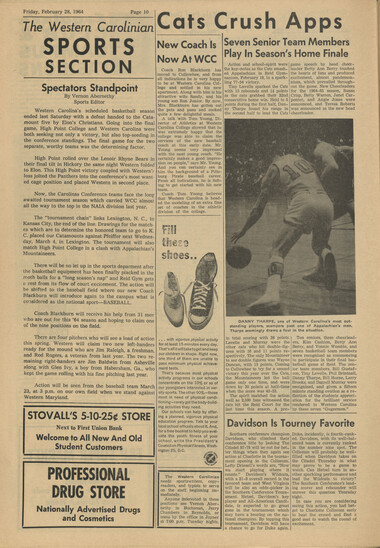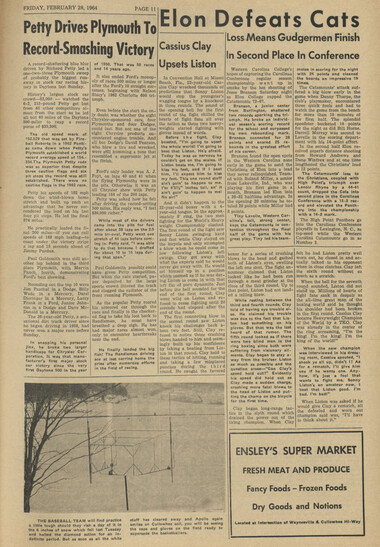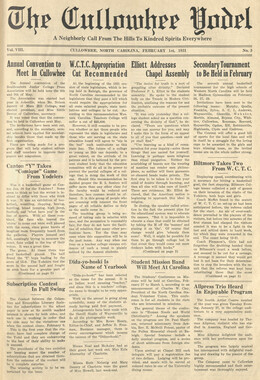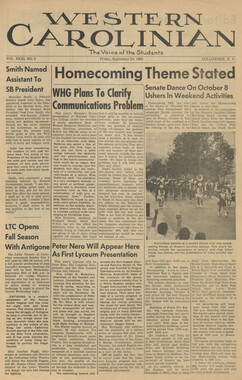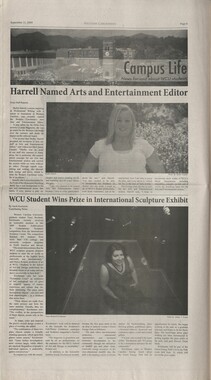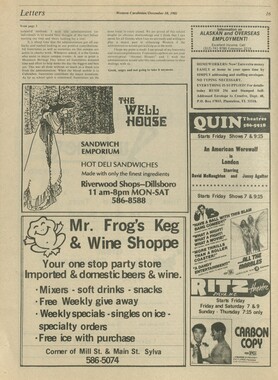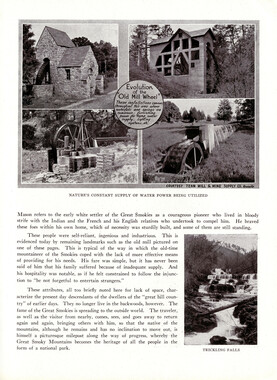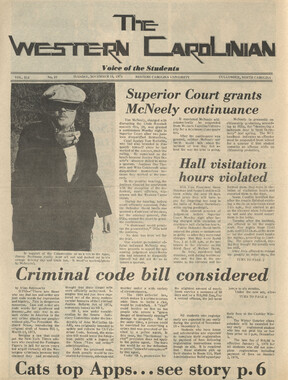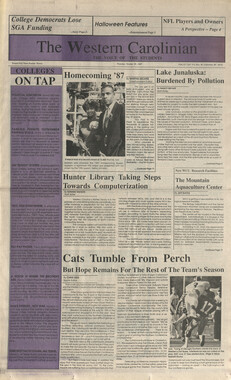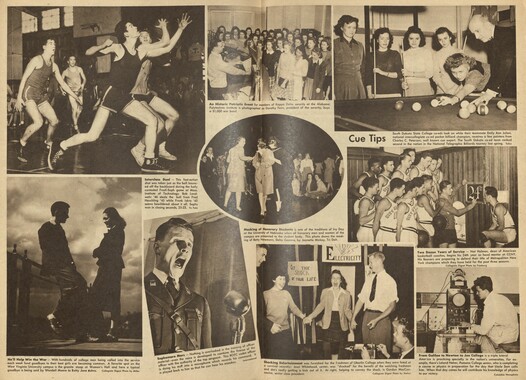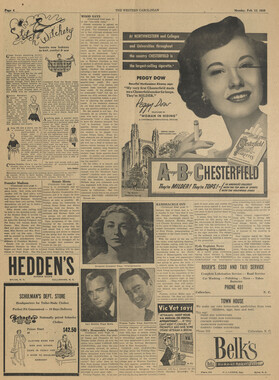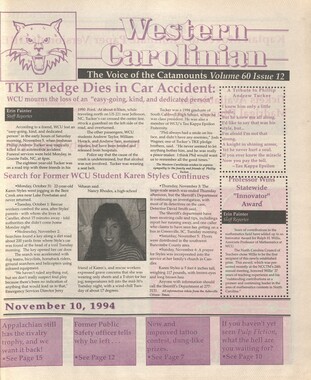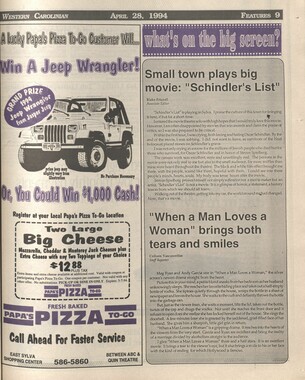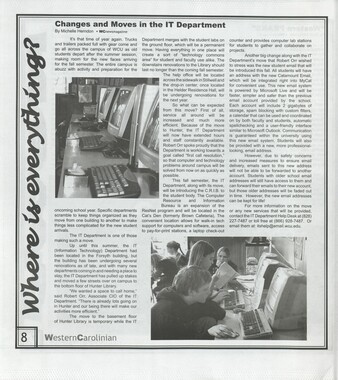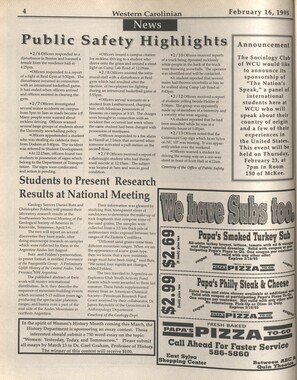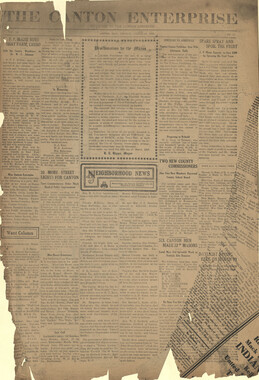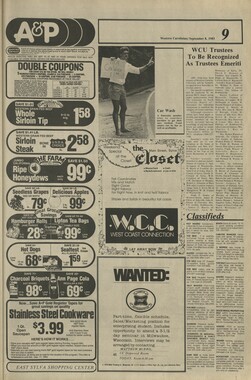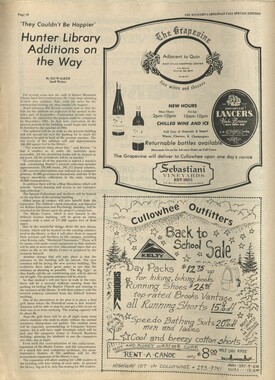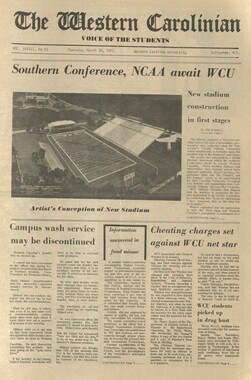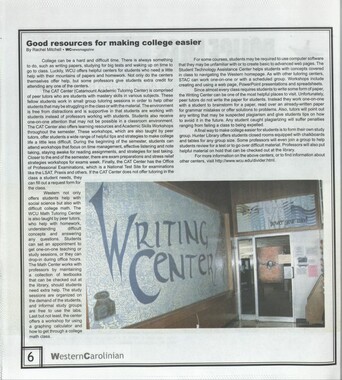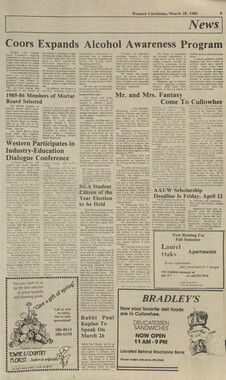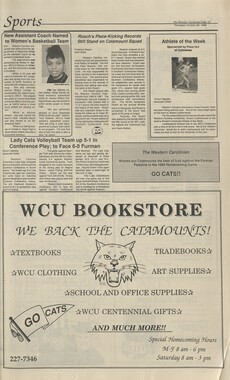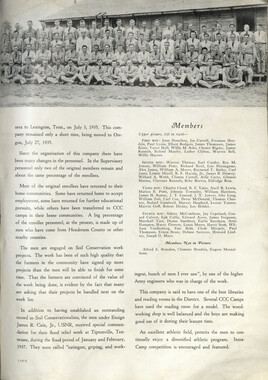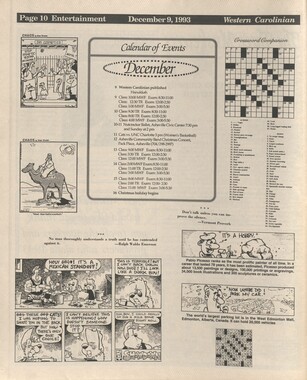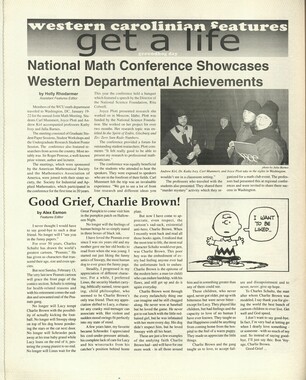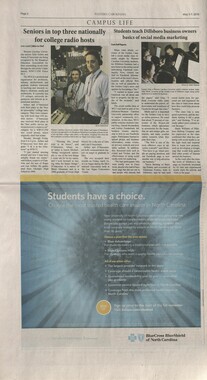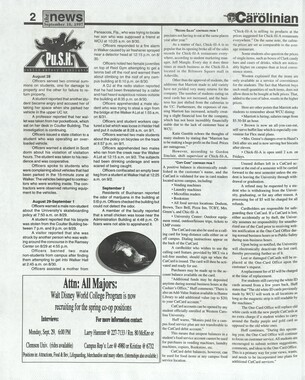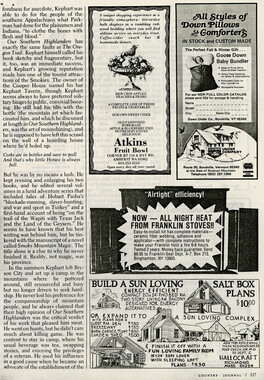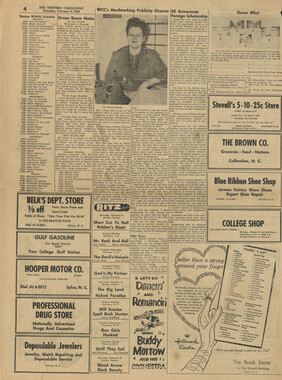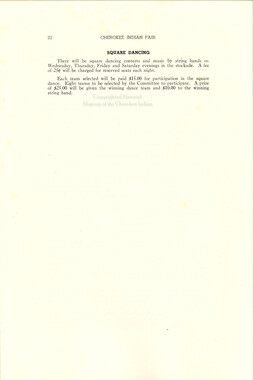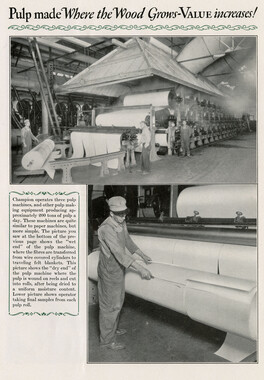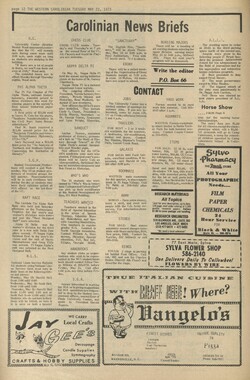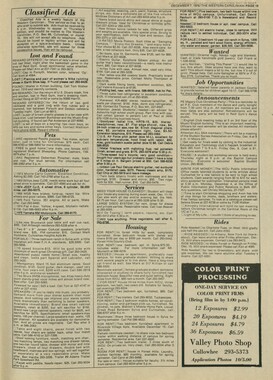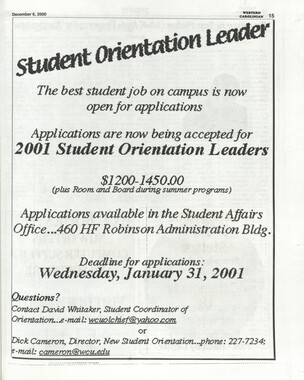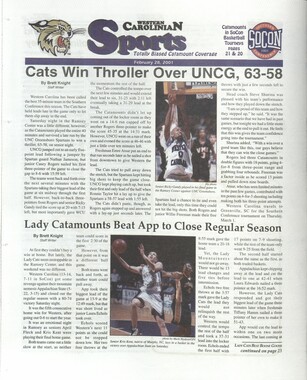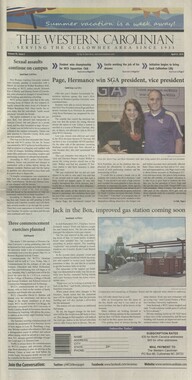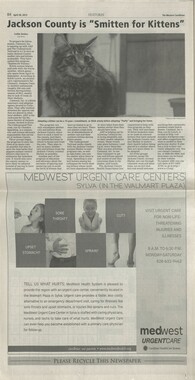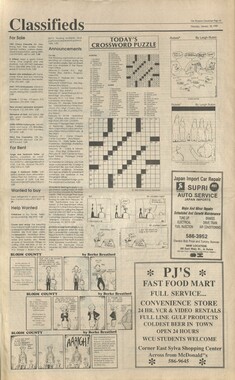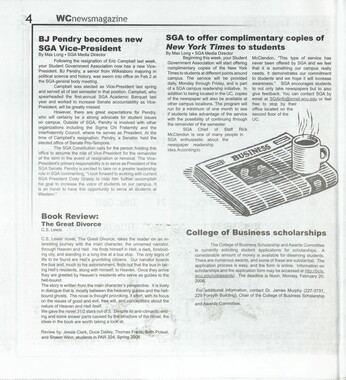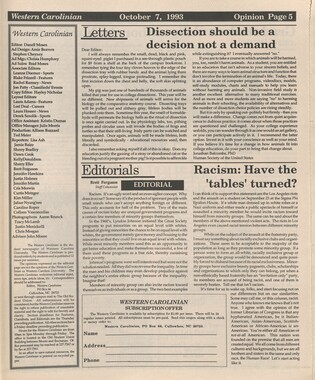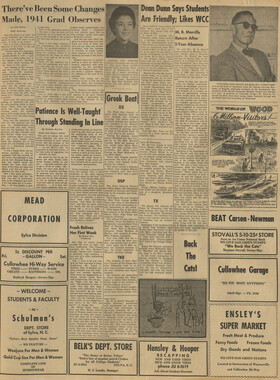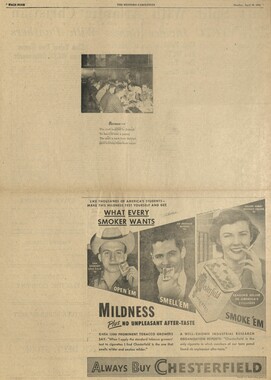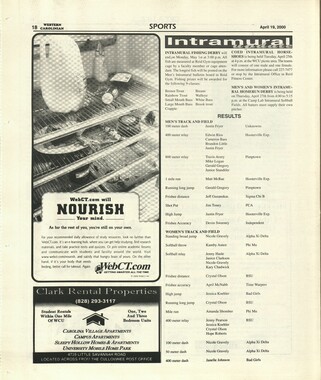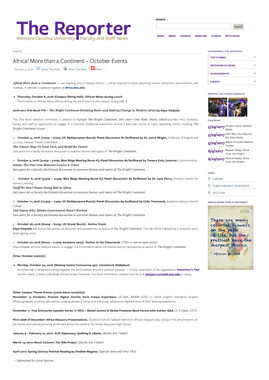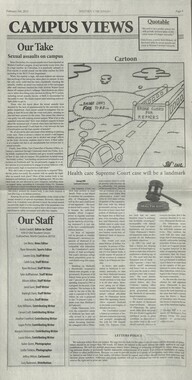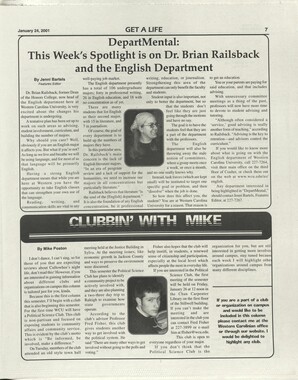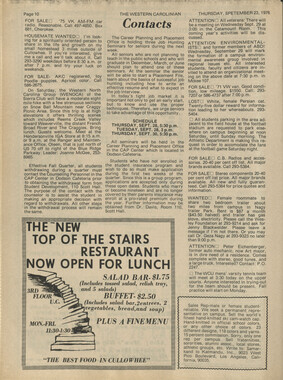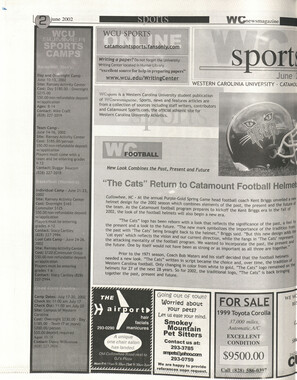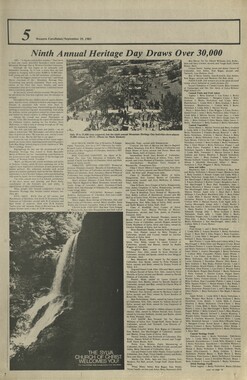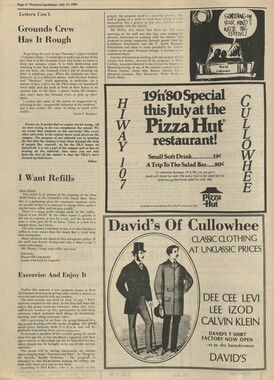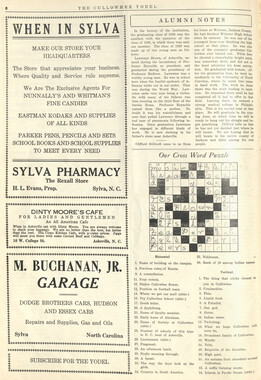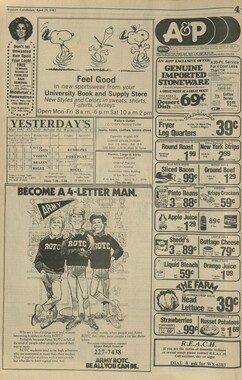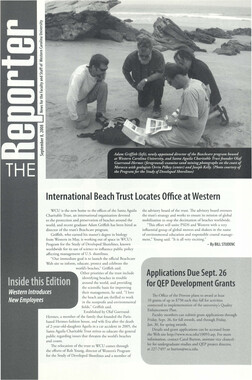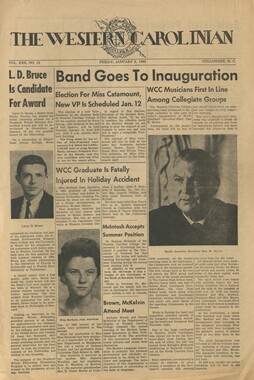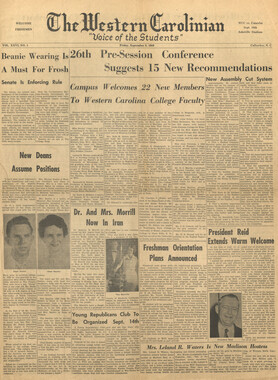Western Carolina University (20)
View all
- Canton Champion Fibre Company (2308)
- Cherokee Traditions (291)
- Civil War in Southern Appalachia (165)
- Craft Revival (1942)
- Great Smoky Mountains - A Park for America (2946)
- Highlights from Western Carolina University (430)
- Horace Kephart (941)
- Journeys Through Jackson (159)
- LGBTQIA+ Archive of Jackson County (85)
- Oral Histories of Western North Carolina (314)
- Picturing Appalachia (6873)
- Stories of Mountain Folk (413)
- Travel Western North Carolina (160)
- Western Carolina University Fine Art Museum Vitreograph Collection (129)
- Western Carolina University Herbarium (92)
- Western Carolina University: Making Memories (738)
- Western Carolina University Publications (2491)
- Western Carolina University Restricted Electronic Theses and Dissertations (146)
- Western North Carolina Regional Maps (71)
- World War II in Southern Appalachia (131)
University of North Carolina Asheville (6)
View all
- Allanstand Cottage Industries (62)
- Appalachian National Park Association (53)
- Bennett, Kelly, 1890-1974 (1463)
- Berry, Walter (76)
- Brasstown Carvers (40)
- Carver, George Washington, 1864?-1943 (26)
- Cathey, Joseph, 1803-1874 (1)
- Champion Fibre Company (233)
- Champion Paper and Fibre Company (297)
- Cherokee Indian Fair Association (16)
- Cherokee Language Program (22)
- Crowe, Amanda (40)
- Edmonston, Thomas Benton, 1842-1907 (7)
- Ensley, A. L. (Abraham Lincoln), 1865-1948 (275)
- Fromer, Irving Rhodes, 1913-1994 (70)
- George Butz (BFS 1907) (46)
- Goodrich, Frances Louisa (120)
- Grant, George Alexander, 1891-1964 (96)
- Heard, Marian Gladys (60)
- Kephart, Calvin, 1883-1969 (15)
- Kephart, Horace, 1862-1931 (313)
- Kephart, Laura, 1862-1954 (39)
- Laney, Gideon Thomas, 1889-1976 (439)
- Masa, George, 1881-1933 (61)
- McElhinney, William Julian, 1896-1953 (44)
- Niggli, Josephina, 1910-1983 (10)
- North Carolina Park Commission (105)
- Osborne, Kezia Stradley (9)
- Owens, Samuel Robert, 1918-1995 (11)
- Penland Weavers and Potters (36)
- Roberts, Vivienne (15)
- Roth, Albert, 1890-1974 (142)
- Schenck, Carl Alwin, 1868-1955 (1)
- Sherrill's Photography Studio (2565)
- Southern Highland Handicraft Guild (127)
- Southern Highlanders, Inc. (71)
- Stalcup, Jesse Bryson (46)
- Stearns, I. K. (213)
- Thompson, James Edward, 1880-1976 (226)
- United States. Indian Arts and Crafts Board (130)
- USFS (683)
- Vance, Zebulon Baird, 1830-1894 (1)
- Weaver, Zebulon, 1872-1948 (58)
- Western Carolina College (230)
- Western Carolina Teachers College (282)
- Western Carolina University (2008)
- Western Carolina University. Mountain Heritage Center (18)
- Whitman, Walt, 1819-1892 (10)
- Wilburn, Hiram Coleman, 1880-1967 (73)
- Williams, Isadora (3)
- Cain, Doreyl Ammons (0)
- Crittenden, Lorraine (0)
- Rhodes, Judy (0)
- Smith, Edward Clark (0)
- Appalachian Region, Southern (2569)
- Asheville (N.C.) (1923)
- Avery County (N.C.) (26)
- Blount County (Tenn.) (195)
- Buncombe County (N.C.) (1672)
- Cherokee County (N.C.) (283)
- Clay County (N.C.) (555)
- Graham County (N.C.) (236)
- Great Smoky Mountains National Park (N.C. and Tenn.) (519)
- Haywood County (N.C.) (3569)
- Henderson County (N.C.) (70)
- Jackson County (N.C.) (4912)
- Knox County (Tenn.) (35)
- Knoxville (Tenn.) (13)
- Lake Santeetlah (N.C.) (10)
- Macon County (N.C.) (420)
- Madison County (N.C.) (215)
- McDowell County (N.C.) (39)
- Mitchell County (N.C.) (132)
- Polk County (N.C.) (35)
- Qualla Boundary (982)
- Rutherford County (N.C.) (76)
- Swain County (N.C.) (2182)
- Transylvania County (N.C.) (270)
- Watauga County (N.C.) (12)
- Waynesville (N.C.) (86)
- Yancey County (N.C.) (72)
- Aerial Photographs (3)
- Aerial Views (60)
- Albums (books) (4)
- Articles (1)
- Artifacts (object Genre) (228)
- Bibliographies (1)
- Biography (general Genre) (2)
- Cards (information Artifacts) (38)
- Clippings (information Artifacts) (191)
- Copybooks (instructional Materials) (3)
- Crafts (art Genres) (622)
- Depictions (visual Works) (21)
- Design Drawings (1)
- Drawings (visual Works) (185)
- Envelopes (73)
- Exhibitions (events) (1)
- Facsimiles (reproductions) (1)
- Fiction (general Genre) (4)
- Financial Records (12)
- Fliers (printed Matter) (67)
- Glass Plate Negatives (381)
- Guidebooks (2)
- Internegatives (10)
- Interviews (815)
- Land Surveys (102)
- Letters (correspondence) (1013)
- Manuscripts (documents) (618)
- Maps (documents) (177)
- Memorandums (25)
- Minutes (administrative Records) (59)
- Negatives (photographs) (6090)
- Newsletters (1290)
- Newspapers (2)
- Notebooks (8)
- Occupation Currency (1)
- Paintings (visual Works) (1)
- Pen And Ink Drawings (1)
- Periodicals (193)
- Personal Narratives (10)
- Photographs (12976)
- Plans (maps) (1)
- Poetry (5)
- Portraits (4568)
- Postcards (329)
- Programs (documents) (181)
- Publications (documents) (2443)
- Questionnaires (65)
- Relief Prints (26)
- Sayings (literary Genre) (1)
- Scrapbooks (282)
- Sheet Music (2)
- Slides (photographs) (402)
- Songs (musical Compositions) (2)
- Sound Recordings (796)
- Specimens (92)
- Speeches (documents) (18)
- Tintypes (photographs) (8)
- Transcripts (322)
- Video Recordings (physical Artifacts) (23)
- Text Messages (0)
- A.L. Ensley Collection (275)
- Appalachian Industrial School Records (7)
- Appalachian National Park Association Records (336)
- Axley-Meroney Collection (2)
- Bayard Wootten Photograph Collection (20)
- Bethel Rural Community Organization Collection (7)
- Blumer Collection (5)
- C.W. Slagle Collection (20)
- Canton Area Historical Museum (2110)
- Carlos C. Campbell Collection (462)
- Cataloochee History Project (64)
- Cherokee Studies Collection (4)
- Daisy Dame Photograph Album (5)
- Daniel Boone VI Collection (1)
- Doris Ulmann Photograph Collection (112)
- Elizabeth H. Lasley Collection (1)
- Elizabeth Woolworth Szold Fleharty Collection (4)
- Frank Fry Collection (95)
- George Masa Collection (173)
- Gideon Laney Collection (452)
- Hazel Scarborough Collection (2)
- Hiram C. Wilburn Papers (28)
- Historic Photographs Collection (236)
- Horace Kephart Collection (861)
- Humbard Collection (33)
- Hunter and Weaver Families Collection (1)
- I. D. Blumenthal Collection (4)
- Isadora Williams Collection (4)
- Jesse Bryson Stalcup Collection (47)
- Jim Thompson Collection (224)
- John B. Battle Collection (7)
- John C. Campbell Folk School Records (80)
- John Parris Collection (6)
- Judaculla Rock project (2)
- Kelly Bennett Collection (1482)
- Love Family Papers (11)
- Major Wiley Parris Civil War Letters (3)
- Map Collection (12)
- McFee-Misemer Civil War Letters (34)
- Mountain Heritage Center Collection (4)
- Norburn - Robertson - Thomson Families Collection (44)
- Pauline Hood Collection (7)
- Pre-Guild Collection (2)
- Qualla Arts and Crafts Mutual Collection (12)
- R.A. Romanes Collection (681)
- Rosser H. Taylor Collection (1)
- Samuel Robert Owens Collection (94)
- Sara Madison Collection (144)
- Sherrill Studio Photo Collection (2558)
- Smoky Mountains Hiking Club Collection (616)
- Stories of Mountain Folk - Radio Programs (374)
- The Reporter, Western Carolina University (510)
- Venoy and Elizabeth Reed Collection (16)
- WCU Gender and Sexuality Oral History Project (32)
- WCU Mountain Heritage Center Oral Histories (25)
- WCU Oral History Collection - Mountain People, Mountain Lives (71)
- WCU Students Newspapers Collection (1923)
- Western North Carolina Tomorrow Black Oral History Project (69)
- William Williams Stringfield Collection (2)
- Zebulon Weaver Collection (109)
- African Americans (390)
- Appalachian Trail (35)
- Artisans (521)
- Cherokee art (84)
- Cherokee artists -- North Carolina (10)
- Cherokee language (21)
- Cherokee pottery (101)
- Cherokee women (208)
- Church buildings (189)
- Civilian Conservation Corps (U.S.) (111)
- College student newspapers and periodicals (2012)
- Dams (107)
- Dance (1023)
- Education (222)
- Floods (61)
- Folk music (1015)
- Forced removal, 1813-1903 (2)
- Forest conservation (220)
- Forests and forestry (1184)
- Gender nonconformity (4)
- Great Smoky Mountains National Park (N.C. and Tenn.) (181)
- Hunting (45)
- Landscape photography (25)
- Logging (119)
- Maps (83)
- Mines and mineral resources (8)
- North Carolina -- Maps (18)
- Paper industry (38)
- Postcards (255)
- Pottery (135)
- Railroad trains (72)
- Rural electrification -- North Carolina, Western (3)
- School integration -- Southern States (2)
- Segregation -- North Carolina, Western (5)
- Slavery (5)
- Sports (452)
- Storytelling (243)
- Waterfalls -- Great Smoky Mountains (N.C. and Tenn.) (66)
- Weaving -- Appalachian Region, Southern (280)
- Wood-carving -- Appalachian Region, Southern (328)
- World War, 1939-1945 (173)
Western Carolinian Volume 29 Number 18
Item
Item’s are ‘child’ level descriptions to ‘parent’ objects, (e.g. one page of a whole book).
-
-
PAGE 12 FRIDAY, FEBRUARY 28, 1964 Recent Art Exhibitions Stimulate Student Interest New Major Added According to Mr. Theodore Matus, the recent art exhibits of Mr. Robert Jolly, Mr. William Lidh, and Matus himself have caused a great deal of interest in art on the part of the student body of WCC. He added that the recent art exhibit of Larry Owens' work in the lobby of Stillwell has caused many students to "stop, look, and appreciate." In addition to these exhibits of local talent, the Art Department Oral Vaccine To Be Given On Campus The STOP POLIO Drive will come to the WCC campus Thursday, March 12. On this date the Sabin Oral Polio Vaccine will be available to students at the Graham Infirmary between the hours of 3:00 and 5:00 p.m. The completely tasteless vaccine will be administered to students by a team of physicians and nurses from the area headquarters on a lump of sugar. A donation of fifty cents or more is suggested, but no one will be refused the vaccine for lack of funds. Polio Is still a crippling disease and hits many people In the United States. The Salk vaccine has reduced the number and severity of polio cases but has not eliminated polio. The majority of people have never received the Salk shot* or have not followed up with the booster shots every two years. Even If they have, they may still be a virus "carrier." A complete series of two feedings of the new Trivalent Sabin vaccine is recommended regardless of any previous shots. To eliminate polio, everyone must take the oral vaccine even though they have had the Salk. The new Trivalent vaccine contains a blend of the three strains of monovalent vaccine. It affords the immunized individual optimum protection against polio by stimulating the production of antibodies in his blood and reduces the likelihood of his becoming a carrier of the disease. Little or no aftereffects have been directly attributed to the vaccine during its administration to millions of persons. Experts believe the Trivalent vaccine will give a relatively long-term immunity a- gainst polio. Since Individuals respond differently and exact data Is not yet available, some experts believe a booster dose should be given every three to four years. Only two doses of the oral vaccine are required for immunization rather than the three Salk shots. All students are urged to receive the first dose of the Sabin vaccine on March 12. The second dose will be administered approximately eight weeks later; the date and time will be announced in a few weeks. recently announced that students of East Carolina College will present an exhibition on the WCC campus in the near future. The Cullowhee branch of the Citizen's Bank and Trust company, which is currently displaying prints and native material work, has requested, according to manager Joseph Fulmer, that some of the finished products of the Art Department be exhilbted in the branch bank. Mr. William Lidh's Art Education and Tempera Paints class was recently host to Mrs. Mal- very Botner's elementary grade students. This enabled Dr. Rodney Leftwieh, head of the Fine and Industrial Arts Department, other art professors, and students, to observe the talent of elementary school children. It also provided an opportunity for the children to enjoy some of the art facilities of the college. The Western North Carolina area provides a rich source for many of the materials used in the Art Department. On February 5, Matus and six of his students: Ann Souther, Janice Whitmire, James Brevard, Kohlan Flynn, Merrill Hens-, ley, and Larry Owen, went to Webster to obtain natural materials for the Art Department. They quarried local deposits of soapstone and were very successful in finding copper oxide, magnesium, and tin ore. Matus stated that he hoped that student interest in the arts would continue. Damages From Snow Battles Are Extensive Approximately one hundred dollars damage was done to various facilities on the WCC campus during the snowball and water battles last week, Mr. E. S. Pettit, College Engineer, announced early this week. On the night of Monday, February 17, a water battle was held on all three floors of Reynolds Dormitory. The fight caused approximately $68.71 in damages. The damage was done to door closures and was caused by slamming doors too hard. It took a crew of four men eight hours to repair the damage. Windows were broken and screens were torn in five buildings during the snowball fights. Moore and Buchanan Dormitories were the hardest hit with damages totaling eight dollars each. Madison and Robertson Dormitories and the Student Union building were also damaged, bringing the minimum total to about thirty-one dollars. Pettit said, "There is a continual need for repairs to buildings due to such instances, but last week was the worst outbreak in some time." At the end of last week a warning was issued from the office of the Dean of Student Affairs stating that all people caught snowballing near college buildings would be punished. I WCC One Of 20 US Colleges Offering Industrial Technology The Industrial Arts Department at Western Carolina College has introduced a new major, Industrial Technology. The B.S. in Industrial Technology is fairly new with only twenty colleges in the United States offering a degree under this title. The new major has been made possible through the efforts of the Fine and Industrial Arts Graham Heads SNEA In '64 Election of officers for next year was the primary business completed at a meeting of the Student National Education Association last Monday evening. Those elected included Carolyn Graham, a Junior Elementary Education major from West Palm Beach, Florida, President; Mary Francis Carpenter, a Junior English and French major from Spindale, Vice-President; Lou Ann Wilson, a Junior Elementary Education major from Sims, Secretary; and Jerry Jones, a Junior Fine and Industrial Arts major from Spindale, Treaurer. Other business included a discussion of the State SNEA Convention to be held in Raleigh March 19-21. At the convention state SNEA officers will be elected and the Mr. and Miss Student Teachers of each college will be presented. A delegation of WCC students, including John Thomas and Shirley Creighton, Mr. and Miss Student Teacher, will atttend. The March meeting will feature Hans Tholander, Swedish exchange student, who will speak on various aspects of the Swedish Educational System. Hans is a Junior Business major attending WCC on a Rotary Scholarship. Summer Jobs Are Reported On The Rise There is an increase of approximately 10% in summer jobs throughout the United States available to students and teachers in 1964 over last year, according to Mrs. Mynena Leith, Editor, "Summer Employment Directory." The greatest increase is found in summer camps (particularly camps for exceptional children), summer theatres, and resorts in the New England and North-Central states. A limited number of jobs are open at the New York World's Fair; students who want to go to The Fair can obtain a job in the eastern states within "day's off" distance of New York. The 1964 "Summer Employment Directory" lists 35,000 specific summer job opportunities all over the country, name and address of the employers which offer them, salary, and a sample letter of application and personal data sheet to assist in making application. Students may consult the "Summer Employment Directory" at the Dean of Student Personnel's office or may order a copy by mail by sending $3.00 (special college student price) to National Directory Service, Box 32065, Dept. 6, Cincinnati, Ohio 45232. Mark "rush" for first-class mailing. Study Abroad Is Increasing Nearly 19,000 American students attended foreign universities during 1963, while 78,000 foreign students were enrolled in American schools. The rapidly growing trend toward international studies Is world-wide, a phase of the "education explosion." More than a quarter of a million students are at schools outside their own countries. They are aided by thousands of free fellowships and scholarships. The 1964 edition of Study A- broad, just published by the Unesco Publications Center in New York, lists the opportunities for support in advanced studies outside the United States. More than 130,000 scholarships and fellowships worth hundreds of millions of dollars are available to assist the world's traveling generation of students. The grants cover every branch of learning and come from universities, governments and foundations in 116 countries. TSome are for periods of a few weeks, other extend for as much as seven years. The book lists 105 different fields of study. Many of the opportunities for foreign study are offered broad headings such as literature, languages or science. International and intergovernmental organizations, including the United Nations, provide more than 10,000 scholarships. More than 290 American universities and colleges offer assistance to students from a- broad. Most of them also grant fellowships abroad to American students. The United States government and private foundations have thousands of additional fellowships available for American as well as for foreign students. Department, the Business Administration Department, and the Science Department. The program is under the direction of Dr. R. L. Leftwieh. In order to graduate with a B. S. in Industrial Technology, a student is required to take courses in Wood Technology, Metal Technology, Drafting Electronics, Power Mechnics and Graphic Arts, along with industry, related courses in Indusrtial Management, Personnel Management, Employee Supervision, Factory Layout, Time and Motion Study, Statistics, Labor Economics and Industrial Psychology, the student must also meet all general education requirements for the Bachelor of Science Degree with Math, Chemistry, and Physics required. Industrial Technology is a program to train technicians to work with engineers and physical scientists. A person with this degree is also qualified to hold supervisory and staff positions in industry. The future for a graduate with a technical education is unlimited, as the type of jobs for which he is trained are among the fastest growing occupations in the United States. Blazer Day Held On February 25 The first fitting for the Class of 1967 blazers was held on Tuesday, February 25, by Mr. Robert Turner of the Robert Rollins Blazers. The 1967 blazers are olive green and the insignia is of gold braid. The cost of the women's blazers is $21.95 and $23.95. The cost for the men's is $24.95, $31.95, and $34.95. There are matching skirts and bermuda shorts available for the women. The skirts are priced from $10.95 to $13.95, and the ber- mudas are $9.95. Last Tuesday was supposed to be the only fitting day, but Mr. Turner stated that if there was enough interest shown in the blazers that he would come back. Any interested Freshmen should notify Ted Whisnant or Charlie Stephens. The iron Curtain ism soundproof. Radio Free Europe speaks daily, intheirownlanguages, to millions of captive people in Poland, Czechoslovakia, Bulgaria, Hungary and Romania. It tells them what is really happening in their countries, and right in their own home towns. In effect, Radio Free Europe is the one opposition newspaper that nobody can stop these enslaved people from reading—with their ears. But Radio Free Europe can't do it all alone. It needs your help, financially. Help to get the truth through the Iron Curtain—by mailing your contribution to: Radio Free Europe, Box 1964, Mtvernon, N.Y.
Object
Object’s are ‘parent’ level descriptions to ‘children’ items, (e.g. a book with pages).
-
The Western Carolinian is Western Carolina University’s student-run newspaper. The paper was published as the Cullowhee Yodel from 1924 to 1931 before changing its name to The Western Carolinian in 1933.
-
